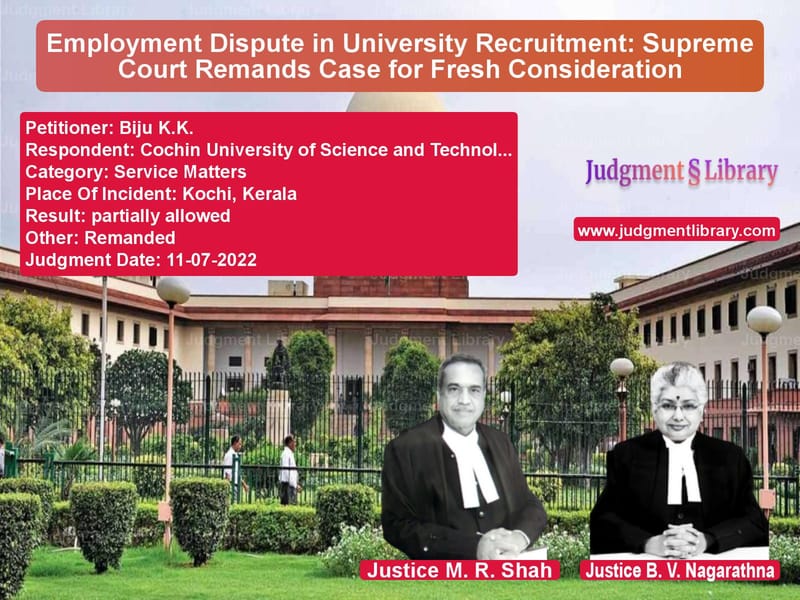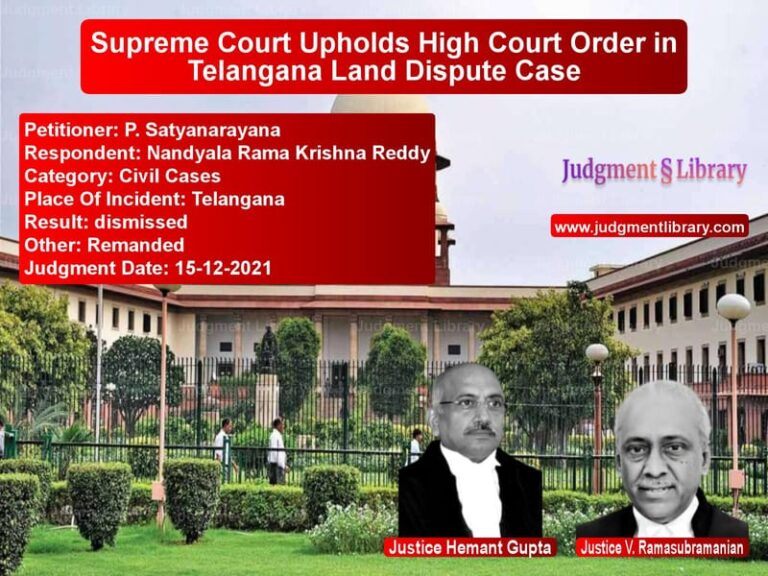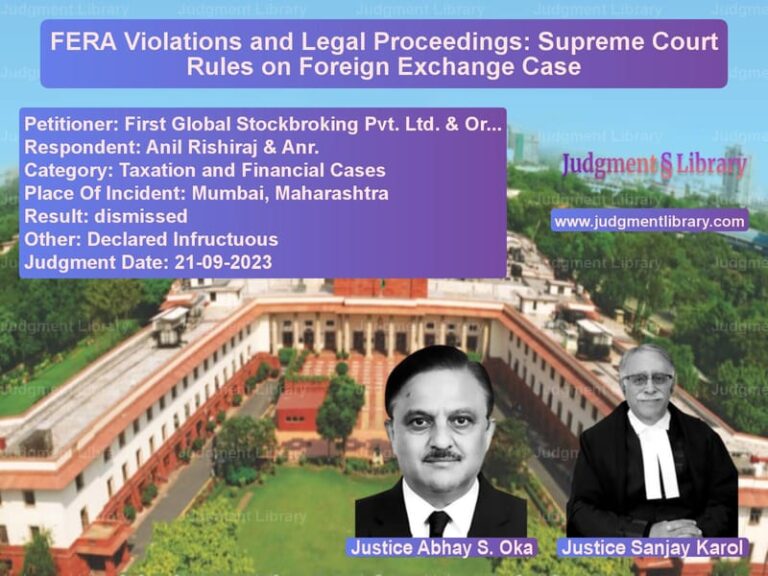Employment Dispute in University Recruitment: Supreme Court Remands Case for Fresh Consideration
The case of Biju K.K. vs. Cochin University of Science and Technology revolves around the selection process for the post of Technical Assistant Grade-II at the Cochin University of Science and Technology (CUSAT). The appellant, Biju K.K., challenged the selection process, arguing that his prior service as a daily wager was unfairly disregarded, and another candidate was appointed without fulfilling the eligibility criteria.
The Supreme Court, in its judgment delivered by M. R. Shah and B. V. Nagarathna, set aside the decisions of the Kerala High Court and remanded the matter for fresh consideration, directing the High Court to examine whether the Selection Committee had acted fairly in awarding marks for experience and in determining eligibility criteria.
Background of the Dispute
The appellant, Biju K.K., had been serving as a Technical Assistant Grade-II on daily wages at the School of Engineering under CUSAT. Over time, he continued in this position with periodic breaks. When a formal recruitment process was initiated through a notification dated 24 July 2010, he applied for the post but was placed lower in the merit list due to fewer marks awarded for experience.
His primary grievances were:
- His earlier service as a daily wager was ignored while awarding marks for experience.
- One of the selected candidates, Respondent No. 5, was found ineligible as he did not possess the requisite qualification.
- Respondent No. 6 was awarded marks despite lacking experience in a Computer Science Lab, as required by the recruitment criteria.
Petitioner’s Arguments
The petitioner, Biju K.K., contended that:
- His daily-wage service should have been counted as valid experience, and its exclusion led to an unfair ranking.
- Respondent No. 5 did not have the necessary qualifications and should not have been appointed.
- Respondent No. 6’s experience was ineligible since it did not meet the requirement of three years in a Computer Science Lab.
- The High Court should have conducted a deeper examination of these claims instead of deferring to the Selection Committee’s decision.
Respondents’ Arguments
The university and the selected candidates defended the selection process, arguing that:
- The Selection Committee had adopted uniform criteria for awarding experience marks.
- Decisions on experience and qualifications were within the purview of the Selection Committee and should not be subject to judicial review.
- Any interference in the ranking process would disrupt the merit-based selection system.
- There was no procedural illegality in the appointments made.
High Court’s Judgment
The Single Judge of the Kerala High Court dismissed Biju K.K.’s writ petition, ruling that:
- The Selection Committee had followed a consistent method for awarding marks, and judicial intervention was unwarranted.
- The claim that Respondent No. 6 lacked the required experience was not sufficient to overturn the selection.
- Only Respondent No. 5’s appointment was invalid, and a revised rank list should be prepared, but no additional relief was granted to the petitioner.
The Division Bench of the High Court upheld this decision, prompting the petitioner to appeal to the Supreme Court.
Supreme Court’s Judgment
The Supreme Court held that the High Court erred in dismissing the petition without adequately examining the claims regarding the selection process. The Court observed:
“When a specific plea was taken before the learned Single Judge that the appellant has been wrongly denied the marks on experience ignoring his earlier service rendered as a daily wager and that the original respondent No. 6 was also lacking the eligibility criteria as respondent No. 6 was not having the experience in a Computer Science Lab, the learned Single Judge refused to consider the same on merits.”
The Court noted that the High Court should have evaluated whether the Selection Committee’s decision was legally justified and should not have dismissed the petition on the ground that the Committee had discretion.
The Supreme Court ruled:
“The matter is remitted to the learned Single Judge to consider the writ petition afresh on whether the Selection Committee was justified in awarding the marks on experience ignoring the services rendered by the appellant as a daily wager and also whether Respondent No. 6 was fulfilling the requisite eligibility criteria as per the advertisement.”
Key Directives from the Supreme Court
- The Kerala High Court’s judgments were set aside.
- The matter was remanded to the Single Judge of the High Court for fresh consideration.
- The High Court was directed to allow parties to submit additional documents within four weeks.
- The reconsideration process was to be completed within six months.
Implications of the Judgment
The Supreme Court’s ruling emphasizes the need for judicial scrutiny in public employment cases where procedural fairness is questioned. Key takeaways include:
- Selection Committees must follow transparent and legally sound procedures.
- Experience gained in temporary or daily-wage positions should not be arbitrarily disregarded.
- Candidates must meet eligibility criteria strictly as per recruitment advertisements.
- Courts should not blindly defer to Selection Committees but must ensure fairness in the process.
Conclusion
The Supreme Court’s decision ensures that employment selection processes remain fair, transparent, and subject to judicial review when allegations of arbitrariness arise. By remanding the case, the Court provided an opportunity for a thorough reconsideration, reinforcing the principle that public employment decisions must adhere to the rule of law and established criteria.
This judgment sets a precedent for future cases where government employees claim unfair treatment in recruitment processes and reaffirms the judiciary’s role in upholding fairness in public employment.
Petitioner Name: Biju K.K..Respondent Name: Cochin University of Science and Technology & Others.Judgment By: Justice M. R. Shah, Justice B. V. Nagarathna.Place Of Incident: Kochi, Kerala.Judgment Date: 11-07-2022.
Don’t miss out on the full details! Download the complete judgment in PDF format below and gain valuable insights instantly!
Download Judgment: biju-k.k.-vs-cochin-university-of-supreme-court-of-india-judgment-dated-11-07-2022.pdf
Directly Download Judgment: Directly download this Judgment
See all petitions in Employment Disputes
See all petitions in Recruitment Policies
See all petitions in Public Sector Employees
See all petitions in Judgment by Mukeshkumar Rasikbhai Shah
See all petitions in Judgment by B.V. Nagarathna
See all petitions in partially allowed
See all petitions in Remanded
See all petitions in supreme court of India judgments July 2022
See all petitions in 2022 judgments
See all posts in Service Matters Category
See all allowed petitions in Service Matters Category
See all Dismissed petitions in Service Matters Category
See all partially allowed petitions in Service Matters Category







